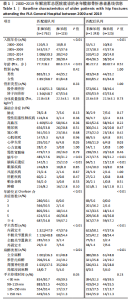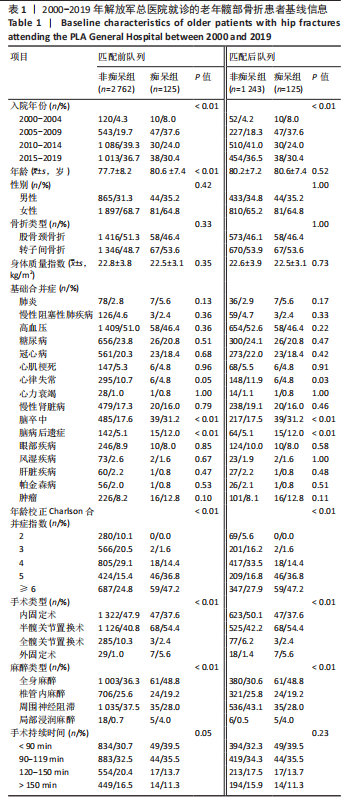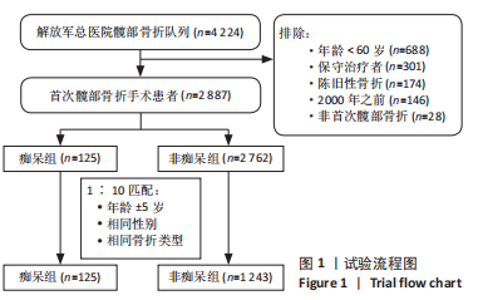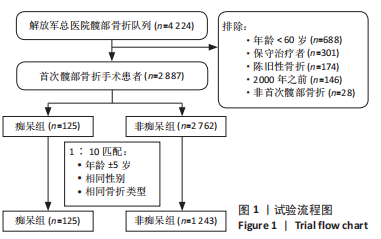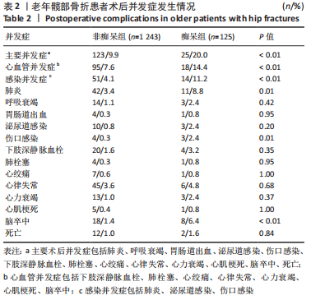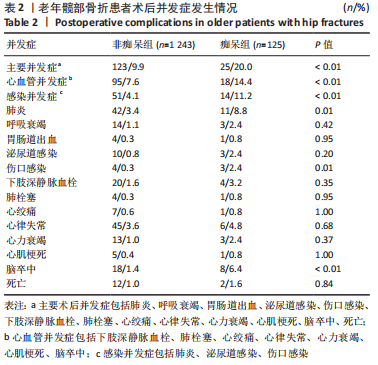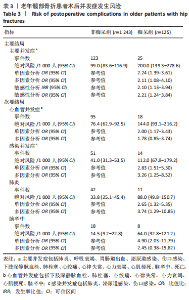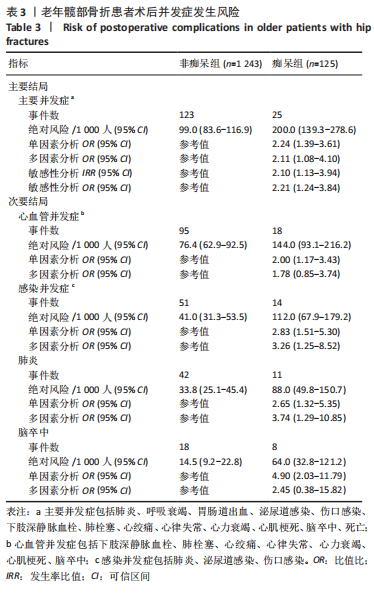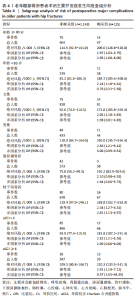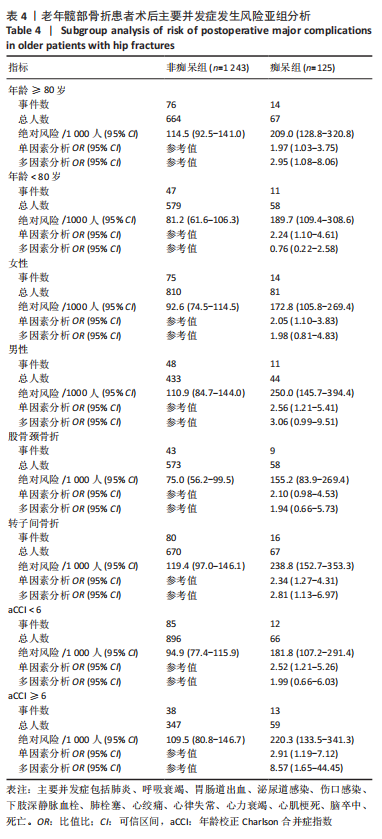[1] O’CONNOR MI, SWITZER JA. AAOS Clinical Practice Guideline Summary: Management of Hip Fractures in Older Adults. J Am Acad Orthop Surg. 2022;30(20):e1291-e1296.
[2] TSUDA Y, YASUNAGA H, HORIGUCHI H, et al. Association between dementia and postoperative complications after hip fracture surgery in the elderly: analysis of 87,654 patients using a national administrative database. Arch Orthop Trauma Surg. 2015;135(11):1511-1517.
[3] PUGELY AJ, MARTIN CT, GAO Y, et al. A risk calculator for short-term morbidity and mortality after hip fracture surgery. J Orthop Trauma. 2014;28(2):63-69.
[4] JIANG Y, LUO Y, LYU H, et al. Trends in Comorbidities and Postoperative Complications of Geriatric Hip Fracture Patients from 2000 to 2019: Results from a Hip Fracture Cohort in a Tertiary Hospital. Orthop Surg. 2021;13(6):1890-1898.
[5] BERRY SD, ROTHBAUM RR, KIEL DP, et al. Association of Clinical Outcomes With Surgical Repair of Hip Fracture vs Nonsurgical Management in Nursing Home Residents With Advanced Dementia. JAMA Intern Med. 2018;178(6):774-780.
[6] SEITZ DP, GILL SS, GRUNEIR A, et al. Effects of dementia on postoperative outcomes of older adults with hip fractures: a population-based study. J Am Med Dir Assoc. 2014;15(5):334-341.
[7] LIVINGSTON G, HUNTLEY J, SOMMERLAD A, et al. Dementia prevention, intervention, and care: 2020 report of the Lancet Commission. Lancet. 2020;396(10248):413-446.
[8] KASSAHUN WT. The effects of pre-existing dementia on surgical outcomes in emergent and nonemergent general surgical procedures: assessing differences in surgical risk with dementia. BMC Geriatr. 2018;18(1):153.
[9] SEITZ DP, ADUNURI N, GILL SS, et al. Prevalence of dementia and cognitive impairment among older adults with hip fractures. J Am Med Dir Assoc. 2011;12(8):556-564.
[10] LUO Y, JIANG Y, XU H, et al. Risk of post-operative cardiovascular event in elderly patients with pre-existing cardiovascular disease who are undergoing hip fracture surgery. Int Orthop. 2021;45(12):3045-3053.
[11] ADESINA SA, EYASAN SU, AMOLE IO, et al. Closed reduction and locked intramedullary nailing of diaphyseal long bone fractures without intra-operative imaging and fracture table. Int Orthop. 2022;46(1):51-59.
[12] CHARLSON ME, CARROZZINO D, GUIDI J, et al. Charlson Comorbidity Index: A Critical Review of Clinimetric Properties. Psychother Psychosom. 2022;91(1):8-35.
[13] SCHELTENS P, DE STROOPER B, KIVIPELTO M, et al. Alzheimer’s disease. Lancet. 2021;397(10284):1577-1590.
[14] LEE SH, KIM KY, LEE JW, et al. Risk of ischaemic stroke in patients with transient global amnesia: a propensity-matched cohort study. Stroke Vasc Neurol. 2022;7(2):101-107.
[15] JIANG Y, LUO Y, LI J, et al. Chronic kidney disease and risk of postoperative cardiovascular events in elderly patients receiving hip fracture surgery. Injury. 2022;53(2):596-602.
[16] TIAN Y, ZHU Y, ZHANG K, et al. Relationship Between Preoperative Hypoalbuminemia and Postoperative Pneumonia Following Geriatric Hip Fracture Surgery: A Propensity-Score Matched and Conditional Logistic Regression Analysis. Clin Interv Aging. 2022;17:495-503.
[17] HANLON P, JANI BD, NICHOLL B, et al. Associations between multimorbidity and adverse health outcomes in UK Biobank and the SAIL Databank: A comparison of longitudinal cohort studies. PLoS Med. 2022;19(3):e1003931.
[18] TANGALOS EG, SMITH GE, IVNIK RJ, et al. The Mini-Mental State Examination in general medical practice: clinical utility and acceptance. Mayo Clin Proc. 1996;71(9):829-837.
[19] TSOI KK, CHAN JY, HIRAI HW, et al. Cognitive Tests to Detect Dementia: A Systematic Review and Meta-analysis. JAMA Intern Med. 2015; 175(9):1450-1458.
[20] O’BRIEN JT, THOMAS A. Vascular dementia. Lancet. 2015;386(10004): 1698-1706.
[21] TAYLOR JP, MCKEITH IG, BURN DJ, et al. New evidence on the management of Lewy body dementia. Lancet Neurol. 2020;19(2): 157-169.
[22] AARSLAND D, CREESE B, POLITIS M, et al. Cognitive decline in Parkinson disease. Nat Rev Neurol. 2017;13(4):217-231.
[23] GALE SA, ACAR D, DAFFNER KR. Dementia. Am J Med. 2018;131(10): 1161-1169.
[24] AHLUWALIA SS, LUGO JD, GORDON AM, et al. The association of dementia on perioperative complications following primary total hip arthroplasty for femoral neck fractures. Eur J Orthop Surg Traumatol. 2022 Mar 1. doi: 10.1007/s00590-022-03236-9. Online ahead of print.
[25] RIDGEWAY S, WILSON J, CHARLET A, et al. Infection of the surgical site after arthroplasty of the hip. J Bone Joint Surg Br. 2005;87(6):844-850.
[26] MITCHELL SL, TENO JM, KIELY DK, et al. The clinical course of advanced dementia. N Engl J Med. 2009;361(16):1529-1538.
[27] SUE EISENSTADT E. Dysphagia and aspiration pneumonia in older adults. J Am Acad Nurse Pract. 2010;22(1):17-22.
[28] LUTSEY PL, CHEN N, MIRABELLI MC, et al. Impaired Lung Function, Lung Disease, and Risk of Incident Dementia. Am J Respir Crit Care Med. 2019;199(11):1385-1396.
[29] JORDAN BC, BRUNGARDT J, REYES J, et al. Dementia as a predictor of mortality in adult trauma patients. Am J Surg. 2018;215(1):48-52.
[30] PEDEN CJ, MILLER TR, DEINER SG, et al. Improving perioperative brain health: an expert consensus review of key actions for the perioperative care team. Br J Anaesth. 2021;126(2):423-432.
[31] CHEN L, AU E, SARIPELLA A, et al. Postoperative outcomes in older surgical patients with preoperative cognitive impairment: A systematic review and meta-analysis. J Clin Anesth. 2022;80:110883.
[32] RANA MV, BONASERA LK, BORDELON GJ. Pharmacologic Considerations of Anesthetic Agents in Geriatric Patients. Anesthesiol Clin. 2017;35(2): 259-271.
[33] SMITH TO, HAMEED YA, CROSS JL, et al. Enhanced rehabilitation and care models for adults with dementia following hip fracture surgery. Cochrane Database Syst Rev. 2015;(6):CD010569.
[34] MORGHEN S, GENTILE S, RICCI E, et al. Rehabilitation of older adults with hip fracture: cognitive function and walking abilities. J Am Geriatr Soc. 2011;59(8):1497-1502. |
